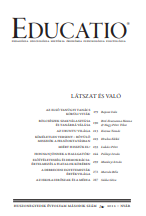Bölcsészek szakválasztása és tanárrá válása - A vallás és az etnikai hovatartozás szerepe a két világháború közötti Magyarországon
The Role of Denomination and of Ethnic Identity in Preferences for Courses of Study of Students of Humanities Between the Two World Wars in Hungary.
Author(s): Zsuzsanna Hanna BiróSubject(s): Education, Jewish studies, Recent History (1900 till today), History of Education, State/Government and Education, Interwar Period (1920 - 1939), History of Antisemitism
Published by: Akadémiai Kiadó
Keywords: Hungary; education; interwar; teachers; denomination; ethnic identity; Jews; students of humanities;
Summary/Abstract: If we assume that the denominational composition of secondary school teachers is the same as the denominational composition of the graduate population, we might be surprised to note that, from 1920 and 1930 census data, whereas nearly one quarter of the population of secondary school graduates and one fifth of university graduates was Jewish, the ratio of Jews among secondary school teachers hardly exceeds 6%. By examining denominational correlations for the probability of being admitted to a Humanities Faculty as a student, the obtaining of a teaching degree and of being later on hired as teacher, it can be observed that the most important demarcation is not to be found in one denomination providing more successful students; neither is it to be found among normal socialpushing factors, nor among the “natural” preferences of school owners – such demarcations came because of emerging forms of anti-Semitism at governmental level. Whereas it can be observed among graduates before 1920 that the chances of Jews (after obtaining a teaching degree) to obtain a teaching position were roughly the same as for Christians (in a schooling system where Jewish denominational secondary schools did not exist!) after 1920, career prospects for Jewish Humanities graduates in secondary schools were dramatically restricted. In addition, opportunities for Christians with a surname having a Hungarian character were much better as regards their getting a full teaching position than those whose German and Slovakian background was more evident. The denominational-ethnic determination of study program choice – examined in the present study only regarding the Christian denomination – is chiefly manifest in connection with ideological subjects (Hungarian, History, foreign languages). Also in relation to the character of a Hungarian surname, Catholic Hungarians tended to choose subject matters related to their world-view (Latin) and Protestants ones related to their national identity (Hungarian, History). In case of people with postulated German names: as regards a Latin literary orientation Roman Catholics are at the forefront, while if given an English literary orientation the Protestants, more precisely German Lutherans, have a lead. For persons with a Slovakian background a contrast between “national” and “international” may be one framework for interpretation. An orientation of Slovakian Catholics for German and French studies fits in with such a phenomenon. Whenever Slovaks favor a subject dealing with national culture, Evangelists will choose Hungarian language and literature and Catholics will most likely choose History.
Journal: Educatio
- Issue Year: 21/2012
- Issue No: 2
- Page Range: 190-212
- Page Count: 23
- Language: Hungarian

